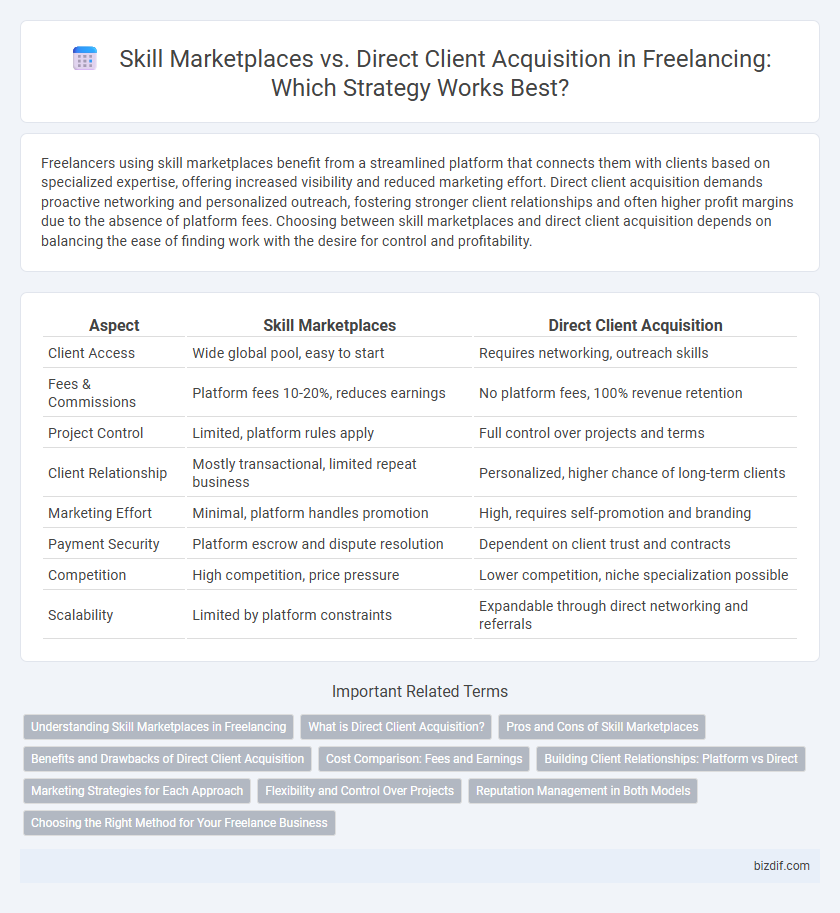Freelancers using skill marketplaces benefit from a streamlined platform that connects them with clients based on specialized expertise, offering increased visibility and reduced marketing effort. Direct client acquisition demands proactive networking and personalized outreach, fostering stronger client relationships and often higher profit margins due to the absence of platform fees. Choosing between skill marketplaces and direct client acquisition depends on balancing the ease of finding work with the desire for control and profitability.
Table of Comparison
| Aspect | Skill Marketplaces | Direct Client Acquisition |
|---|---|---|
| Client Access | Wide global pool, easy to start | Requires networking, outreach skills |
| Fees & Commissions | Platform fees 10-20%, reduces earnings | No platform fees, 100% revenue retention |
| Project Control | Limited, platform rules apply | Full control over projects and terms |
| Client Relationship | Mostly transactional, limited repeat business | Personalized, higher chance of long-term clients |
| Marketing Effort | Minimal, platform handles promotion | High, requires self-promotion and branding |
| Payment Security | Platform escrow and dispute resolution | Dependent on client trust and contracts |
| Competition | High competition, price pressure | Lower competition, niche specialization possible |
| Scalability | Limited by platform constraints | Expandable through direct networking and referrals |
Understanding Skill Marketplaces in Freelancing
Skill marketplaces in freelancing serve as centralized platforms connecting freelancers with clients, offering streamlined access to a vast pool of projects and reducing the need for extensive self-marketing. These platforms provide built-in trust mechanisms such as reviews, escrow payments, and dispute resolution, which help mitigate risks for both parties. Understanding the features and fee structures of popular skill marketplaces like Upwork, Fiverr, and Toptal is crucial for freelancers aiming to optimize their earnings and exposure.
What is Direct Client Acquisition?
Direct client acquisition involves freelancers actively seeking and securing projects by contacting clients without intermediaries or platforms. This method enables personalized communication, often resulting in higher profit margins and stronger client relationships compared to skill marketplaces. Mastery of marketing, networking, and negotiation skills is essential for successful direct client acquisition.
Pros and Cons of Skill Marketplaces
Skill marketplaces offer freelancers access to a broad client base and streamlined project management tools, providing convenience and exposure without the need for extensive self-marketing. However, high platform fees, intense competition, and limited control over client relationships can reduce overall earnings and hinder long-term business growth. Despite these drawbacks, skill marketplaces remain a popular entry point for freelancers seeking consistent work and portfolio building.
Benefits and Drawbacks of Direct Client Acquisition
Direct client acquisition offers greater control over project selection, pricing, and communication, allowing freelancers to build personalized relationships and secure long-term contracts, which enhances income stability. However, it requires significant time investment in marketing, networking, and negotiating contracts, with inconsistent lead flow creating potential cash flow challenges. Unlike skill marketplaces, direct acquisition eliminates platform fees but demands strong self-promotion skills and administrative management.
Cost Comparison: Fees and Earnings
Skill marketplaces typically charge service fees ranging from 10% to 20%, significantly reducing freelancers' overall earnings. Direct client acquisition eliminates platform fees, allowing freelancers to retain 100% of their income but often incurs higher marketing and administrative costs. Evaluating cost efficiency depends on balancing marketplace fees against the expenses and efforts required to attract and manage clients independently.
Building Client Relationships: Platform vs Direct
Skill marketplaces provide freelancers with access to a broad client base, but building deep, long-term relationships is often limited due to platform controls and competition. Direct client acquisition fosters stronger trust and personalized communication, enabling freelancers to tailor services and secure repeat business. Establishing direct connections enhances client retention and revenue growth beyond the transactional nature of most marketplaces.
Marketing Strategies for Each Approach
Skill marketplaces provide freelancers with a ready-made platform to showcase portfolios and leverage built-in search algorithms for client discovery, often relying on optimized profiles and keyword-targeted proposals as primary marketing strategies. Direct client acquisition demands personalized outreach, networking, and relationship-building tactics, supported by targeted content marketing and social media presence to establish trust and authority in specific niches. Understanding these distinct marketing approaches helps freelancers maximize visibility and conversion rates in either environment.
Flexibility and Control Over Projects
Skill marketplaces offer freelancers flexibility by providing access to a wide range of projects without the need for extensive client outreach, but often come with platform fees and limited control over project terms. Direct client acquisition grants freelancers greater control over project scope, deadlines, and pricing, enabling tailored service delivery and stronger client relationships. Balancing both approaches can optimize flexibility while maximizing autonomy and income potential in freelancing careers.
Reputation Management in Both Models
Skill marketplaces offer structured reputation management through ratings and reviews, providing freelancers with visible social proof that attracts new clients efficiently. Direct client acquisition relies heavily on personal branding and consistent communication to build trust and long-term relationships, making reputation management more proactive and personalized. Both models demand continuous quality delivery and client satisfaction to enhance credibility and secure ongoing work opportunities.
Choosing the Right Method for Your Freelance Business
Skill marketplaces offer freelancers access to a broad client base and streamlined job opportunities, ideal for building portfolio and gaining consistent work. Direct client acquisition enables stronger relationship building, higher rates, and greater control over projects, best suited for experienced freelancers seeking long-term engagements. Evaluating your business goals, experience level, and desired client interaction will guide the choice between scalable marketplace exposure or personalized client development.
Skill marketplaces vs Direct client acquisition Infographic

 bizdif.com
bizdif.com